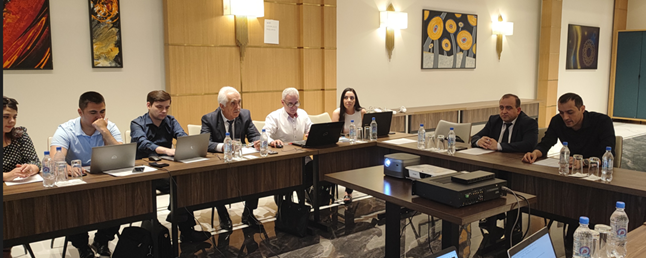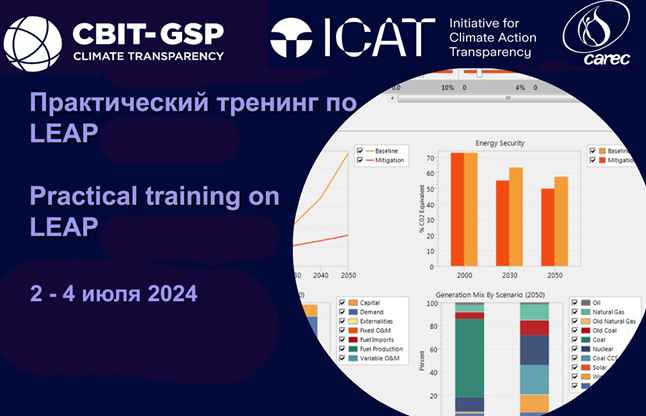Dushanbe, Tajikistan – July 2, 2024 – A training workshop on the Low Emissions Analysis Platform (LEAP SEI) begins today and will take place July 2-4, 2024 in Dushanbe, Tajikistan. This hands-on training, organized by the Regional Climate Action Transparency Hub for Central Asia (ReCATH) together with the Capacity Building Initiative for Transparency – Global Support Programme (CBIT-GSP) with support from the Copenhagen Climate Centre UNEP-CCC, aims to strengthen the capacity of national experts from Central Asia and the Caucasus (Armenia, Azerbaijan) in energy policy analysis and climate change mitigation assessment.
LEAP, developed by SEI, is a widely used software tool for energy policy analysis and climate change mitigation assessment. It is used in more than 190 countries around the world, including government agencies, academia, non-governmental organizations, consulting companies, and energy utilities. LEAP has been applied at a variety of scales, from city and state to national, regional and global levels, making it the standard for integrated resource planning, greenhouse gas mitigation assessment and low-emission development strategies (LEDS), especially in developing countries.
Many countries have chosen to use LEAP as part of their reporting obligations to the United Nations Framework Convention on Climate Change (UNFCCC). In particular, at least 32 countries have used LEAP to create energy and emissions scenarios that formed the basis of their Nationally Determined Contributions (NDCs) to climate change.
Unlike a model of a specific energy system, LEAP is a versatile tool that allows the creation of models for a variety of energy systems, each requiring unique data structures. It supports a wide range of modeling methodologies, from bottom-up end-use accounting methods to top-down demand-side macroeconomic modeling, as well as a number of supply-side accounting, modeling, and optimization methodologies. These capabilities are powerful enough to model power generation and capacity expansion planning, and flexible enough to incorporate data and results from other specialized models.
The objective of the training in Dushanbe is to provide participants with practical knowledge on how to work with the LEAP model, understand the data requirements and use its outputs to make informed decisions.
Highlights of the training:
– Introduction to LEAP: Overview of the LEAP model, its structure and data requirements.
– Energy Demand Modeling: Hands-on sessions on modeling energy demand in households, transportation, industry, and services.
– Energy Supply Modeling: Sessions on energy and energy transformation, including power generation and refineries.
– Emissions Modeling: Detailed guidance on modeling emissions and creating mitigation scenarios.
– Cost-Benefit Analysis: Detailed guidance on how to conduct cost-benefit analysis using LEAP to make informed decisions.
The cooperation and knowledge sharing facilitated by this training will play an important role in promoting sustainable energy development and climate resilience in Central Asia and the Caucasus.

Brief note:
The Regional Climate Action Transparency Center (ReCATH) project in Central Asia is an implementation of the Initiative for Climate Action Transparency (ICAT), which supports countries in developing their capacity to create and manage a robust transparent framework that will enable them to effectively meet obligations under the Paris Agreement and facilitates the transition of countries to the new reporting under the Enhanced Transparency Framework (ETF).
The ReCATH project is implementing a collaborative approach that brings together five Central Asian states (Kazakhstan, Kyrgyzstan, Tajikistan, Turkmenistan and Uzbekistan) and supports technical experts and expert institutions in the region to create sustainable and integrated Measurement, Reporting, and Verification (MER/V) systems. English: MRV/transparency). The ReCATH project is implemented by the Central Asia Regional Environmental Center (CAREC).
The Capacity Building Initiative for Transparency – Global Support Program (abbreviated as CBIT-GSP) is a five-year global project funded by the Global Environment Facility (GEF), implemented by the United Nations Environment Program (UNEP) and implemented by the UNEP Copenhagen Climate Center (UNEP- CCC). The purpose of the CBIT-GSP is to provide streamlined support and capacity building at national, regional and global levels to help developing countries implement the reporting provisions of the UNFCCC and the enhanced transparency framework of the Paris Agreement and ultimately increase the ambition of climate action. CBIT-GSP is implemented through regional networks. For the countries of Central Asia and the Caucasus, the project works with Azerbaijan, Armenia, Kazakhstan, Kyrgyzstan, Tajikistan, Turkmenistan and Uzbekistan.
Given the commonalities of both projects in supporting the region to meet capacity needs on transparency and ETFs, CAREC/ReCATH and CBIT-GSP are collaborating to organize a regional face-to-face workshop on adaptation reporting: ETF/BTR requirements, best practices and existing methodologies and approaches.
Additional information:
Dilovarsho Dustzoda, ReCATH Project Manager, recath_manager@carececo.org
Oksana Kravtsova, ReCATH Project Specialist, okravtsova@carececo.org
ICAT website: www.climateactiontransparency.org
Project page: https://carececo.org/main/activity/projects/recath
#ReCATH #ICAT #climatechange #CAREC #NDC #ParisAgreement #Greenhouseemmissions #CBIT-GSP #UNEP-CCC #LEAP
#ONUW #vapor gases #ParisAgreement

